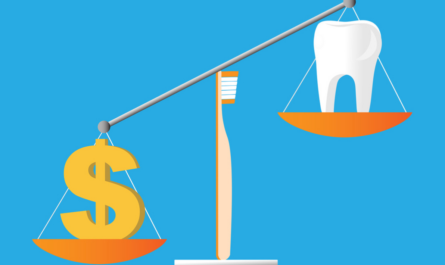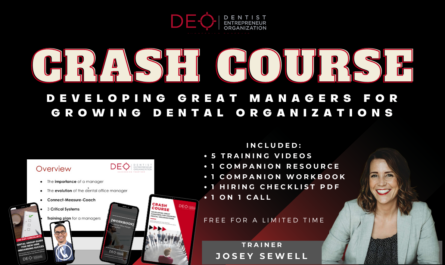By Ginny Hegarty, SPHR
If I had a dollar for every dentist and dental team member who has rationalized disappointing performance as a byproduct of the state of the economy over the past few years, I would be writing this column from my favorite beach in Maui! Now, as much as I would enjoy spending time on a beach in Maui, I would truly much rather put an end to the myths that we are all victims of circumstances and success is beyond our control. So much time, energy, opportunity and joy are wasted in this mindset.
FAILING TO PLAN IS AKIN TO PLANNING TO FAIL
Studies show that 70% of businesses that struggle do so because of poor planning, not economic conditions. In my experience, as soon as a practice leader rationalizes poor performance as a result of conditions outside of the team’s control, it is human nature for the team to take their foot off the gas. They will literally breath a sigh of relief – “Whew, she gets it! We’re trying hard and it’s not our fault that there are so many openings in the schedule or that collections are down for the month”. You are then all invested in this new normal that is beyond your control and it becomes a self-fulfilling reactive prophecy.
Interestingly enough, at the same time one team is accepting a new normal, the practice across the street that has decided to turn their sights inward to focus on what they CAN control rather than what they cannot, is experiencing a new normal as well, but theirs is a self-fulfilling proactive prophecy. While the majority of people claim not to like change, there is no denying that change is inevitable. It may help to remember that change on our own terms is so much more enjoyable than change that is thrust upon us.
Not only will the proactive team have better results than the reactive team, the energy level, morale and atmosphere in their practice will be upbeat, enthusiastic and alive while the other team is down, defensive and defeated. Nothing zaps the positive energy from a room like the feeling of being stuck in a situation that you cannot control. Nervousness, drama and panic get invited in and fester. Great American Industrialist and thought-leader Henry Ford taught the power of positive energy and enthusiasm when he said, “Enthusiasm is the yeast that makes your hopes shine to the stars. Enthusiasm is the sparkle in your eyes, the swing in your gait, the grip of your hand, the irresistible surge of will and energy to execute your ideas.” Enthusiasm is an essential ingredient of success.
Now is also as good a time as any to revisit Winston Churchill’s wisdom “Those that fail to learn from history, are doomed to repeat it.” Science has the skinny on what motivates people; business simply won’t embrace it. Every business owner can make this choice on his or her own and reap the rewards of this science any time they are ready to take the plunge into strategic planning and engaging intrinsic motivators.
Jeff Besos, founder, President, CEO and Chairman of the Board of Amazon spends four hours every Tuesday on Strategic Planning – not on operations or budgets, but on Strategic Planning. It sure does seem to be paying off for him. According to Forbes, Amazon’s shares “defied gravity” in 2011, jumping 55% and adding $6.5 billion to his net worth. I’m guessing that most dentists don’t spend four hours per year on Strategic Planning – herein lies a tremendous opportunity for the savvy dentist.
INTENSE MYOPIA
As you prepare to do your Strategic Planning, you must first establish your leadership position. Do you believe that people are intrinsically or extrinsically motivated?
We’re all very familiar with the carrot and the stick approach to motivation. Most businesses are structured on the belief that human beings are fundamentally inert & passive and can only be motivated by an elaborate system of rewards and punishments. Strange, people don’t admit to being that way themselves, but they feel it’s true about everyone else!
Best selling author of Drive, Daniel Pink believes this is fundamentally a wrong assumption that has lead business to ignore science for over 40 years. He believes simply watching a toddler at play easily disproves this premise and supports that “the default setting for human beings is active and engaged, not inert and passive.” Yet, rather than follow the science and tap into our intrinsic desire to engage, rewards and punishment, carrots and sticks prevail as the most popular means to motivate an manage employees to achieve consistently great performance. As a result, business leaders continue to scratch their heads and wonder why they don’t achieve their desired results.
An iconic example of using sales incentives and punishments to ignite results can be seen in the 1992 film Glen Gary Glen Ross. Rolling Stone described the film as “a brilliant dark comedy that doesn’t just dazzle, it stings.” The incredible cast included Al Pacino, Jack Lemon, Kevin Spacey, Ed Harris and Alec Baldwin. I can attest that the story and the acting were compelling enough to reel me in; but I still vividly remember being exhausted and feeling like I had been beaten up after watching this movie. You may recall Alec Baldwin, the film’s “alpha dog motivational sales person” announcing “We are adding a little something to this month’s sales contest: First prize is a Cadillac Eldorado, Second Prize is a set of steak knives and Third Prize is “you’re fired!” Those are some sharp sticks that eventually had the sales force resort to criminal behavior as they marched to the beat of “A-B-C – Always-Be-Closing”.
The average workplace has evolved since 1992 and most businesses have adopted a kinder, gentler approach to motivating the team. Unfortunately, most still focus on the extrinsic reward rather than the intrinsic and most teams still underachieve. When talking with new clients, one of the greatest frustrations they express to me is that the bonus system they have in place is taken for granted and is no longer achieving the desired effect. In some cases, the team will make the case that even though they didn’t achieve the goal, they should still receive the bonus, because they have come to count on that money to live. In other cases, the bonus is the only means for team members to realize any raise in income and because bonus is not being reached, it has not only become a de-motivator, it has completely deflated team morale. The impact goes far beyond bonus and has a disastrous effect on productivity, profitability and team retention.
TURNING TO SCIENCE
When the team is no longer motivated to earn the bonus and the practice owner has come to resent the bonus, it’s crystal clear that the bonus is not working for anyone. Still, some doctors are looking for the next generation bonus system that will magically make it all better. They are doomed to repeat history if they don’t learn the lesson well that a sweeter carrot or a sharper stick is not the solution. I believe that sustainable energy, motivation and passion are intrinsic and are not achieved or sustained by extrinsic motivators. The plan, that is, the strategy needs refinement. To paraphrase Albert Einstein “We can’t solve problems with the same mindset that created them in the first place.”
Back in the 1930’s, scientist Carl Duncker conducted experiments, the most famous of which was “The Candle Problem” (Google Candle Problem) that explained his theory of Functional Fixedness that substantiated his belief that creativity was necessary in certain types of problem solving. Dr. Sam Gluckesburg of Princeton University expanded on the Candle Problem to determine if attaching a monetary reward to solving the problem would incentivize the participants to work faster. The result was that those who were offered the highest financial reward for their performance took 3.5 minutes longer to reach the solution. Incentives are so good at capturing and focusing attention on the ‘prize’ that they keep us intensively focused on running toward the solution, missing outside creative opportunities for a better solution. This singular focus is also responsible for some people losing their moral compass and having lapses in judgment as they focus entirely on a singular result. This is certainly an interesting study that sheds great light on some of the business fiascos we’ve witnessed of late.
Additional experiments at M.I.T. [The Massachusetts Institute of Technology] had similar conclusions supporting the notion that bonuses, commissions and incentives dulled thinking and blocked creativity when anything “beyond rudimentary cognitive skills” were required in the problem solving activity. As long as the task was simple and straightforward, the carrot reward system worked beautifully. Once creativity was required, the carrot slowed down results. It created what Pink calls an intense myopia that has you fixated on the carrot, boxing you in and keeping you from recognizing lateral signals. Consider that technology has automated most of our rudimentary tasks and we are all required to engage creatively to achieve results and you will understand just how groundbreaking these conclusions are.
THE PARADOX OF MOTIVATION
In another interesting study at the Art Institute of Chicago, some students enrolled simply because they loved art and enjoyed the creative process, while others wished to make their living as artists. Checking in with these students twenty years later, researchers found that about half of the students had become successful artists and had their work hanging in galleries and even in museums. This half was made up almost entirely of those who were intrinsically motivated; they were not seeking extrinsic rewards, it was the byproduct of their passionate commitment to their art. The Paradox of Motivation is that the most direct way to achieve extrinsic rewards is not to seek them.
Back in the early ‘90s I worked with a hygienist we’ll call Jayne. The doctor who owned the practice had decided he wished to encourage an ownership mentality in Jayne and he shifted her to a commission-based pay structure, thus paying her essentially like an associate. He built in a six-month security blanket assuring her that her compensation would not fall below the level she would have earned had she been paid on an hourly basis. Still, Jayne was nervous.
As I observed her on day one of this new pay system, Jayne had a small calculator in her jacket pocket. After each patient I saw her do her calculations and keep a running total of what she had earned throughout the day. Mid-morning I called Jayne aside and asked her to please take a leap of faith with me and put the calculator away. I challenged her to keep her focus on doing the very best she could for every single patient, to treat them as she would treat her own mother or her own husband. Keeping her focus on providing exceptional care i.e., doing the right thing, for the right reasons would bring her success on every level.
Jayne was an exceptional hygienist and a good person who took great pride in her work. That year she earned more as a hygienist than she ever dreamed she would. She also raised the bar on the quality of care she was providing her patients because she was working with passion and purpose. Once we took the money off the table and she gained faith that the potential was there for her to be well paid for doing great work, success was within her grasp and her patients were the beneficiary of her intrinsic desire to do well.
AUTONOMY ~ MASTERY & PURPOSE
According to a 2010 survey by Simply Hired, 83% of job seekers say they would rather have a job they love than a job that pays well. Now of course, that doesn’t mean people don’t value money. Money is a motivator in that you must pay people enough to take money off the table by allowing them the security to know they can pay their bills and take care of their families. Pink believes people have an innate sense of fairness about pay. What they want most is AUTONOMY ~ MASTERY & PURPOSE.
Proof of this desire is vividly found in companies like Google and Zappos. Google offers their employees 20% time – that’s basically 1/5 of their time can be spent pursuing projects and new ideas they are passionate about. This is, by all accounts more of an attitude than a strict measure of time spent. The culture works because the team also shares other core values around time, purpose and impact. It also works because it is more driven by individuals than by management. Innovations like Gmail, Google News, Google Earth, Google Sky and Google Talk are all the result of 20% time. Google also retains the intellectual property rights to all of these innovations.
20% time isn’t so new – it was actually practiced by 3M during the 1950’s and was known as 15% time. Masking tape and Post-it Notes were the results of this core value initiative. Once again we see proof that change over time doesn’t require that you leave the past behind – take the best ideas with you, such as the 3M idea and as Google did when they gave their employees the AUTONOMY to engage their creative ideas.
Dan Pink is among the thought leaders such as Harvard Psychologist Dan Gilbert and Dan Ariely in his book Predictably Irrational – the Hidden Forces That Shape Our Decisions, that are delving into the treasure trove of scientific evidence that supports a belief that human nature is not as predictable or as traditionally logical as it was once thought to be. How many people would have predicted the open source movement? Both Pink and Ariely ask who would have thought that technically sophisticated workers who have full-time jobs would take on mastery of a new challenge on their own time for no financial gain, and would give it away rather than sell it, simply because they enjoyed doing it? How else can you explain Linux, Apache, and Wikipedia? The authors go on to question why people take up learning languages or playing musical instruments on the weekends. The reasons repeated over and over again in their research are “for the challenge, because it’s interesting, to achieve MASTERY, precisely because it’s self-directed and to make a contribution.”
The third ingredient in the shift to understanding and tapping into our intrinsic drive and incorporating it into a strategic plan is to help your team to see the meaning, the PURPOSE in their work. When I meet with a team the first time, I ask them to tell me the most important role they play on the team. Inevitably, the focus is much too narrow and the responses are all position driven: I’m a hygienist, I’m an assistant… my favorites are the ones who identify themselves as a piece of furniture when they say “I’m the front desk.” Wow, we really need to elevate some team members’ self-images!
I recently challenged a team to define their role, their purpose and what they do without using any of the words found in their job descriptions or titles. Try it with your team. It’s actually a lot harder to do than you might think. As the doctor and his assisting team took on this challenge, the sterilization assistant said, “I guess you could say I’m just the cleaning lady.”
You would all have been so proud of this woman’s colleagues who jumped in and redefined her role in the practice for her. By the time they were finished, this sterilization assistant told me “By doing her work well, she supports every patient and the success of every member of the team. She also prevents patients from getting sick and so she saves lives.” What a special transformation as this woman realized, maybe for the first time, that she was a critical part of this team. There truly was a physical transformation and I could see Franny walking taller with an air of confidence and a smile a mile wide on her face. You see, passion, purpose and a strong desire to make a difference through meaningful work can change the world.
Bloomberg Business Week’s Annual Report of Customer Service Champs has Zappos’ customer service rivaling that of The Four Seasons and Ritz Carlton! Anyone who thinks that Zappos is in the business of selling shoes would never have imagined that a shoe retailer could evoke such great response from its customers. But those who recognize that Zappos’ CEO Tony Hsieh has created a culture that focuses on delivering happiness, totally get why they are rated so high.
The title of Hsieh’s best selling book is Delivering Happiness. Zappos focuses on hiring people who want to make a difference. In fact, when I saw Tony Hsieh speak last year, he said they offer all new hires approximately $3,500 to quit after an initial 3-week training period. They have found that those who choose to forgo the $3,500 have the intrinsic desire to be part of a company that is passionate about customer service. Zappos can then trust these people to consistently exceed customer expectations. Zappos doesn’t use elaborate scripts, they don’t time service calls; they simply direct their support team to ‘make the customer happy’. AUTONOMY, MASTERY AND PURPOSE in an environment that is fun, friendly and focused on making a difference as they deliver happiness.
Who would ever have guessed that a ‘call center’ could be such an inspirational place to work? It defies logic – that is, the logic that is based in an old paradigm. It is the CEO, Tony Hsieh’s dream that in time, as the company evolves, people will actually forget they started as a shoe retailer and they will be known simply as a great service company. In one more positive example of history repeating itself, this is the exact trajectory that Nordstrom took to develop its current reputation as a customer service champ.
The world is waking up to this new reality as many more companies are placing a serious focus on the good work they do. The Profit Motive is being successfully paired with The Purpose Motive to create an opportunity for companies and individuals to make a living and a life as a force for positive change in the world.
Doctors, as practice owners, embracing a Strategic Planning process will support the leadership framework for all of your HR Development responsibilities and goals including Recruitment, Team Training & Development, Compensation & Benefits and Employment Law Compliance. Rather than taking on a new responsibility, the strategic planning process will actually simplify your life by providing the perfect umbrella to bring your work together with a shared purpose.
HISTORY REPEATING ITSELF AGAIN
This new paradigm of embracing Strategic Planning along with Autonomy, Mastery and Purpose is again, not new. Henry Ford was espousing these virtues in the early part of the last century. Mr. Ford died in 1947 many years before I was born, but I sure would have loved to have met him and had the opportunity to watch him think. His was a beautiful mind, as evidenced by more of his famous quotes:
- “Before everything else, getting ready is the secret to success,”
- “It has been my observation that most people get ahead during the time that others waste.”
- “There is one rule and that is: Make the best quality of goods possible at the lowest cost possible, paying the highest wages possible.”
- “When everything seems to be going against you, remember that the airplane takes off against the wind, not with it.”
- Thinking is the hardest work there is, which is probably the reason so few engage in it.”
- “A business that makes nothing but money is a poor business.”
- And my favorite, “You can’t build a reputation on what you are going to do.”
You might be tempted to say Mr. Ford was full of “good, old-fashioned common sense,” but his philosophy is quite similar to the advise offered by our scientists that has been, as Daniel Pink puts it “This body of work on contingent motivators is the most robust findings in social science … and the most ignored.” Funny that Henry Ford & Dan Pink have so much in common; even more fun that in light of this, Dan Pink’s book is titled Drive.
There’s nothing common about this sense at all – yet it holds great promise for those who will embrace it. The choice is yours.
I’ll leave you with one more ‘Fordism’, perhaps his most famous:
“Whether you belive you can do a thing or not, you are right.”
Ginny is best known as a turnaround expert specializing in practice renewal as she leads new teams or teams that have plateaued to rediscover and build on their strengths. She has worked as a patient care coordinator, financial coordinator, treatment coordinator, hygiene coordinator, office manager and practice administrator, in addition to her work in sales and software systems integration. Now, with over 25 years of experience, certification as a Senior Professional in Human Resources (SPHR) and an extensive background as a speaker, writer, and consultant, Ginny Hegarty, owner and President of Dental Practice Development, Inc., is recognized as a leader in the dental community. Clients describe Ginny as “a master communicator, a management strategist with a keen eye for analyzing practice data and identifying where your purpose and focus must be, and a caring, personable, upbeat motivator.” Ginny is a visiting faculty member at The Las Vegas Institute for Advanced Dental Studies (LVI). She has published articles in numerous trade journals and serves as the HR content advisor for The Progressive Dentist Magazine. Ginny also lectures at the Kornberg School of Dentistry, at Temple University in Philadelphia as part of the Practice Management Program, and is the President-Elect of the Academy of Dental Management Consultants. Ginny describes herself as “Passionate about empowering dentists and their teams to improve their practices and their lives.” [email protected]





